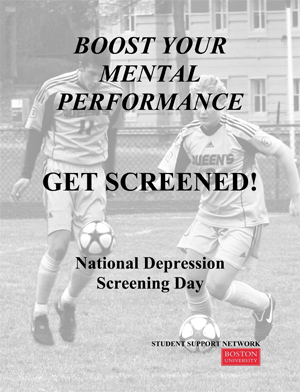Depression Screenings Today
Always tired? Can’t focus? Free screenings could change your life

The words “I’m depressed” are often tossed around casually. But the real thing—clinical depression—is a serious, potentially life-threatening illness believed to affect as many as 41 percent of college-age men and women, according to a 12-year study by Hofstra University. The same study found that the rate of depression among college students climbed 7 percent from 1997 to 2009. Today is National Depression Screening Day, and BU is joining universities around the United States in setting up screening sites across campus to educate students about depression and make help available to those who need it.
With so many cases of undiagnosed depression, the importance of screening can’t be underestimated, says Margaret Ross, a psychiatrist and director of BU Student Health Services Behavioral Medicine, which last year saw 1,000 more new patients than it had the previous year. Behavioral Medicine, along with Sargent College’s Center for Psychiatric Rehabilitation, is staffing this year’s four screening sites. The screening sites, at the GSU Link, the upstairs atrium at Sargent College, the area near the FitRec snack bar, and the School of Public Health’s Talbot Building, 715 Albany St., on the Medical Campus, all have private areas for students to speak one-on-one with staff. Screening will be offered from 2:30 until 6 p.m.
Also open to BU faculty and staff, the screening asks people to fill out a one-page anonymous questionnaire, with results reviewed on site by a mental health professional.
“It’s not counseling,” says Ross. “It’s an assessment.” Fine-tuned over decades of research and used as a self-test on sites like the Mayo Clinic, the screening tool helps counselors distinguish a student at risk from someone who’s merely having a bad week. Screening organizers are urging all students, not just those with mental health concerns, to fill out the questionnaire.
“I really hope students will consider being screened as a proactive way to take care of their health and support their overall happiness on campus,” says Andrea Bengston, advisor to the student mental health advocacy organization Active Minds. Students’ replies to the multiple-choice questions can also indicate whether depression is mild or severe. While many students might suffer from sleeplessness, irritability, or reduced appetite, depression is defined by a combination of these and other symptoms.
Difficulty falling asleep or staying asleep—or sleeping far too much—is one of the questionnaire’s nine symptoms that, in various combinations, point to clinical depression. Other symptoms include lack of interest or pleasure in doing things, feeling down or hopeless, fatigue, feeling like you’re a failure or a disappointment to your family, trouble concentrating on reading or watching TV, moving or speaking so slowly others have noticed—or acting fidgety or restless—and thoughts of hurting yourself, or suicide.
“Maybe what you’re feeling isn’t just homesickness or fatigue,” says Ross. “If these feelings are interfering with your ability to get to class, finish your work, or just enjoy your life, there may be something more serious (but totally treatable) that is gradually taking hold.” Ross and her colleagues hope that the screening day also helps curb the stigma, easing but still powerful, against seeking treatment for mental illness. “Students will go to their peers,” she says. “Many feel ashamed about their depression, or they don’t want their parents to know.” Despite assurances to the contrary, they may worry that visiting Behavioral Services, which is free, will cost them money.
“We want students to see depression screening as an aspect of self-care, like having your blood pressure taken,” says Dori Hutchinson, director of services at the Center for Psychiatric Rehabilitation. “We want to promote a community culture of mental wellness.”
Hutchinson says the simple screening could save lives. Suicide is the second leading cause of death among college students. Research indicates that 18-to-24-year-olds contemplate suicide more than any other age group, and teens diagnosed with depression are five times more likely than adults to attempt suicide. When people are deeply depressed, they can’t see a way out, Hutchinson says. She and Ross hope that the screening effort conveys the message: help is out there for anyone who needs it.
The screenings are free and confidential, and Behavioral Services staff will be on hand to tell students about counseling and other services. Anyone can complete the screening questionnaire and discuss the results with a health professional, who will provide a referral list of clinicians and treatment facilities.
More information about mental health services at BU can be found here.
Susan Seligson can be reached at sueselig@bu.edu.
Comments & Discussion
Boston University moderates comments to facilitate an informed, substantive, civil conversation. Abusive, profane, self-promotional, misleading, incoherent or off-topic comments will be rejected. Moderators are staffed during regular business hours (EST) and can only accept comments written in English. Statistics or facts must include a citation or a link to the citation.